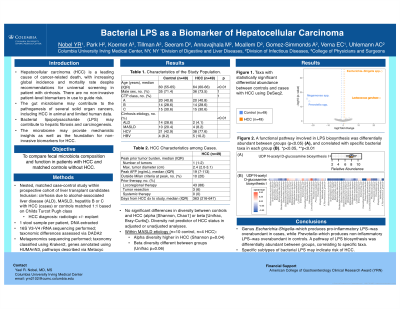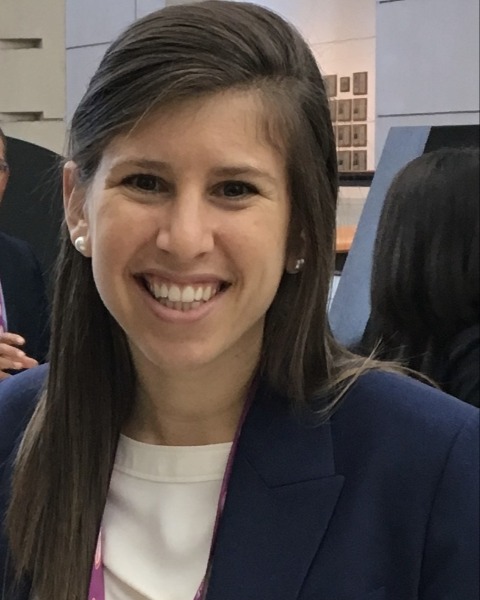Monday Poster Session
Category: Liver
P2421 - Gut Microbiota as a Biomarker of Hepatocellular Carcinoma in Patients With Cirrhosis
Monday, October 23, 2023
10:30 AM - 4:15 PM PT
Location: Exhibit Hall

Has Audio

Yael R. Nobel, MD, MS
Columbia University Irving Medical Center
New York, NY
Presenting Author(s)
Award: Presidential Poster Award
Yael R.. Nobel, MD, MS, Heekuk Park, PhD, Anna Koerner, BA, Alice M.. Tillman, BA, Dwayne Seeram, BA, Dalia H.. Moallem, BA, Medini K.. Annavajhala, PhD, Angela Gomez-Simmonds, MD, MS, Elizabeth C.. Verna, MD, MS, Anne-Catrin Uhlemann, MD, PhD
Columbia University Irving Medical Center, New York, NY
Introduction: Hepatocellular carcinoma (HCC) is often diagnosed at a late stage. Gut dysbiosis – an imbalance of microbial communities – may contribute to the risk of certain malignancies. We investigated the gut microbiota as a potential biomarker of HCC.
Methods: This was a nested case-control study of patients with or without HCC in a prospective cohort of liver transplant candidates. Patients with cirrhosis due to hepatitis B (HBV) or C (HCV), alcohol-related liver disease (ALD), or non-alcoholic fatty liver disease (NAFLD) were eligible. Cases with HCC were matched 1:1 to controls based on Childs Turcot Pugh (CTP) class, a known modifier of microbiome composition. One stool sample per patient underwent DNA extraction and 16S rRNA sequencing. Taxonomic differences were assessed using DADA2.
Results: We identified 49 cases with HCC and 49 matched controls (Table). Compared to controls, cases were older (median 64 vs. 60 years, p< 0.01) and more likely to have HCV (78% vs. 43%) as opposed to ALD (4% vs. 29%) or NAFLD (8% vs. 20%) (p< 0.01). Most cases had early-stage HCC: 80% had peak prior tumor burden within Milan criteria and none had prior systemic therapy. Alpha and beta diversity did not differ between groups. Shannon index did not predict HCC in univariate analysis or when adjusted for age, cirrhosis etiology, and antibiotic exposure. However, multiple taxa were differentially abundant by DESeq2. Genus Escherichia-Shigella – which produces pro-inflammatory lipopolysaccharide (LPS), a potential contributor to hepatic fibrosis and carcinogenesis – was overabundant in cases; Prevotella – which produces non-inflammatory LPS – was overabundant in controls (Fig. 1A). Because HCC risk differs by liver disease etiology, stratified analyses were performed. Among patients with NAFLD (n=14), CTP class remained similar between groups. Alpha diversity was higher in cases with NAFLD than controls with NAFLD (p=0.04; Fig. 1B) and there was a trend toward distinct beta diversity (p=0.06; Fig. 1C). Controls with NAFLD had increased abundance of Prevotella and multiple species of Bacteroides, which also produce anti-inflammatory LPS.
Discussion: In cirrhotic liver transplant candidates, presence of HCC was associated with increased abundance of intestinal bacteria that produce pro-inflammatory LPS and reduced abundance of those that produce non-inflammatory LPS. HCC-associated dysbiosis was most pronounced in patients with NAFLD. The gut microbiota may provide a noninvasive biomarker of early-stage HCC.

Disclosures:
Yael R.. Nobel, MD, MS, Heekuk Park, PhD, Anna Koerner, BA, Alice M.. Tillman, BA, Dwayne Seeram, BA, Dalia H.. Moallem, BA, Medini K.. Annavajhala, PhD, Angela Gomez-Simmonds, MD, MS, Elizabeth C.. Verna, MD, MS, Anne-Catrin Uhlemann, MD, PhD. P2421 - Gut Microbiota as a Biomarker of Hepatocellular Carcinoma in Patients With Cirrhosis, ACG 2023 Annual Scientific Meeting Abstracts. Vancouver, BC, Canada: American College of Gastroenterology.
Yael R.. Nobel, MD, MS, Heekuk Park, PhD, Anna Koerner, BA, Alice M.. Tillman, BA, Dwayne Seeram, BA, Dalia H.. Moallem, BA, Medini K.. Annavajhala, PhD, Angela Gomez-Simmonds, MD, MS, Elizabeth C.. Verna, MD, MS, Anne-Catrin Uhlemann, MD, PhD
Columbia University Irving Medical Center, New York, NY
Introduction: Hepatocellular carcinoma (HCC) is often diagnosed at a late stage. Gut dysbiosis – an imbalance of microbial communities – may contribute to the risk of certain malignancies. We investigated the gut microbiota as a potential biomarker of HCC.
Methods: This was a nested case-control study of patients with or without HCC in a prospective cohort of liver transplant candidates. Patients with cirrhosis due to hepatitis B (HBV) or C (HCV), alcohol-related liver disease (ALD), or non-alcoholic fatty liver disease (NAFLD) were eligible. Cases with HCC were matched 1:1 to controls based on Childs Turcot Pugh (CTP) class, a known modifier of microbiome composition. One stool sample per patient underwent DNA extraction and 16S rRNA sequencing. Taxonomic differences were assessed using DADA2.
Results: We identified 49 cases with HCC and 49 matched controls (Table). Compared to controls, cases were older (median 64 vs. 60 years, p< 0.01) and more likely to have HCV (78% vs. 43%) as opposed to ALD (4% vs. 29%) or NAFLD (8% vs. 20%) (p< 0.01). Most cases had early-stage HCC: 80% had peak prior tumor burden within Milan criteria and none had prior systemic therapy. Alpha and beta diversity did not differ between groups. Shannon index did not predict HCC in univariate analysis or when adjusted for age, cirrhosis etiology, and antibiotic exposure. However, multiple taxa were differentially abundant by DESeq2. Genus Escherichia-Shigella – which produces pro-inflammatory lipopolysaccharide (LPS), a potential contributor to hepatic fibrosis and carcinogenesis – was overabundant in cases; Prevotella – which produces non-inflammatory LPS – was overabundant in controls (Fig. 1A). Because HCC risk differs by liver disease etiology, stratified analyses were performed. Among patients with NAFLD (n=14), CTP class remained similar between groups. Alpha diversity was higher in cases with NAFLD than controls with NAFLD (p=0.04; Fig. 1B) and there was a trend toward distinct beta diversity (p=0.06; Fig. 1C). Controls with NAFLD had increased abundance of Prevotella and multiple species of Bacteroides, which also produce anti-inflammatory LPS.
Discussion: In cirrhotic liver transplant candidates, presence of HCC was associated with increased abundance of intestinal bacteria that produce pro-inflammatory LPS and reduced abundance of those that produce non-inflammatory LPS. HCC-associated dysbiosis was most pronounced in patients with NAFLD. The gut microbiota may provide a noninvasive biomarker of early-stage HCC.

Figure: Figure 1. (A) Differentially abundant taxa in controls (n=49) versus patients with HCC (n=49). (B) In the subset of patients with NAFLD, alpha diversity was higher in patients with HCC and NAFLD (n=4) than controls with NAFLD (n=10). (B) Beta diversity in patients with HCC and NAFLD (n=4) compared to controls with NAFLD (n=10).
Disclosures:
Yael Nobel indicated no relevant financial relationships.
Heekuk Park indicated no relevant financial relationships.
Anna Koerner indicated no relevant financial relationships.
Alice Tillman indicated no relevant financial relationships.
Dwayne Seeram indicated no relevant financial relationships.
Dalia Moallem indicated no relevant financial relationships.
Medini Annavajhala indicated no relevant financial relationships.
Angela Gomez-Simmonds indicated no relevant financial relationships.
Elizabeth Verna indicated no relevant financial relationships.
Anne-Catrin Uhlemann indicated no relevant financial relationships.
Yael R.. Nobel, MD, MS, Heekuk Park, PhD, Anna Koerner, BA, Alice M.. Tillman, BA, Dwayne Seeram, BA, Dalia H.. Moallem, BA, Medini K.. Annavajhala, PhD, Angela Gomez-Simmonds, MD, MS, Elizabeth C.. Verna, MD, MS, Anne-Catrin Uhlemann, MD, PhD. P2421 - Gut Microbiota as a Biomarker of Hepatocellular Carcinoma in Patients With Cirrhosis, ACG 2023 Annual Scientific Meeting Abstracts. Vancouver, BC, Canada: American College of Gastroenterology.

